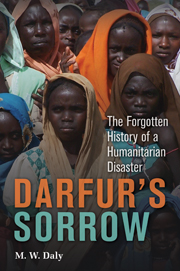Book contents
- Frontmatter
- Contents
- List of Figures
- Preface to the Second Edition
- Acknowledgments
- Chronology of Events
- Maps
- 1 The “Abode of the Blacks”
- 2 Lords of Mountain and Savanna
- 3 The Ends of the Turkish World
- 4 Darfur at the End of Time
- 5 Between an Anvil and a Hammer
- 6 “Closed District”
- 7 Unequal Struggles, 1939–1955
- 8 Colonial Legacies and Sudanese Rule, 1956–1969
- 9 Darfur and “The May Regime,” 1969–1985
- 10 Third Time Unlucky
- 11 The State of Jihad
- 12 The Destruction of Darfur
- Glossary
- Abbreviations in the Bibliography and Notes
- Notes
- Bibliography
- Index
8 - Colonial Legacies and Sudanese Rule, 1956–1969
Published online by Cambridge University Press: 05 August 2012
- Frontmatter
- Contents
- List of Figures
- Preface to the Second Edition
- Acknowledgments
- Chronology of Events
- Maps
- 1 The “Abode of the Blacks”
- 2 Lords of Mountain and Savanna
- 3 The Ends of the Turkish World
- 4 Darfur at the End of Time
- 5 Between an Anvil and a Hammer
- 6 “Closed District”
- 7 Unequal Struggles, 1939–1955
- 8 Colonial Legacies and Sudanese Rule, 1956–1969
- 9 Darfur and “The May Regime,” 1969–1985
- 10 Third Time Unlucky
- 11 The State of Jihad
- 12 The Destruction of Darfur
- Glossary
- Abbreviations in the Bibliography and Notes
- Notes
- Bibliography
- Index
Summary
DARFUR AT INDEPENDENCE
The Sudan achieved independence in unique circumstances. Most obviously, the cooperation and competition of the co-domini had brought a degree of economic development and speed to self-government that would not have occurred under a single colonial master. But that competition, and the sectarian division that advanced with it, poisoned political development. The parliamentary system, on the Westminster model, empowered the Khartoum elite while providing little scope for outlying regions to compete for resources. Although the familiar theme of postcolonial dominance of center over periphery would, in the Sudan's case, be identified with ethnic and religious differences between north and south, it was evident in relation to all regions.
The rush to self-determination left many aspects of statehood incomplete. These included relations with the former co-domini, ownership of their property, the rights of their and other foreign citizens, terms of service for remaining civil servants, currency, accession to treaties, the Nile waters, informal border arrangements, and much else. The country had no constitution: government carried on under authority of the old regime's ordinances, as implicitly recognized in parliamentary elections; the head of state was a five-man committee. Mutiny and subsequent atrocities in Equatoria in late 1955 hinted at what lay in store there. Development plans mooted in the late days of the Condominium immediately encountered insufficiency of funds.
- Type
- Chapter
- Information
- Darfur's SorrowThe Forgotten History of a Humanitarian Disaster, pp. 177 - 200Publisher: Cambridge University PressPrint publication year: 2010



